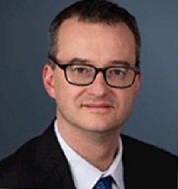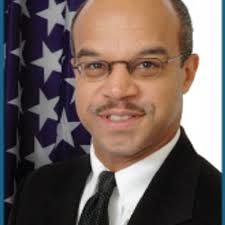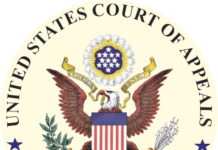(Updated to include Kelly news conference, more details from debate and edits throughout)
The Kansas Senate on Wednesday rejected Gov. Laura Kelly’s nominee to the Kansas Court of Appeals who came under fire from Republicans questioning his background as a criminal defense attorney and whether he was prepared for the job.
Federal public defender Carl Folsom III came up three votes short of the 21 needed to be confirmed as a judge, making him the second of the governor’s appeals court appointments to be turned down since taking office. The vote was 18-17.
Last year, the Senate unanimously rejected Jeffry Jack’s nomination to the Kansas Court of Appeals after a series of his angry tweets directed toward conservative politicians surfaced.

Kelly held an impromptu news conference late Wednesday afternoon to respond to the Senate’s decision.
With Folsom at her side, Kelly lashed out at lawmakers for inserting politics into the Kansas court system.
“What you have in my nominee is one of the very best and one of the very brightest,” Kelly said during a 2 1/2 minute meeting with reporters without taking questions.
She noted that Folsom has appealed more than 200 cases, including more than 40 in oral arguments.
“He has done nothing for his entire life but serve the people of Kansas,” she said. “His qualifications are without question.
“Why they did this, I don’t know,” Kelly said. “It sounds like politics me. To let him become the collateral damage for political games is absolutely wrong.”
Folsom drew criticism from Republicans who voiced concern about his lack of civil litigation experience and his narrow career path that focused mostly on criminal defense work.
They also questioned his work appealing the sentence of a client who pled guilty to one count of child pornography in Oklahoma about eight years ago and was sentenced to 120 months in prison followed by five months of supervised release.
The FBI discovered more than 20,000 images depicting child pornography on the client’s computer, including images of children between 5 and 14 years old.
Folsom was one of the lawyers who appealed the sentence, which also barred his client from using or possessing a computer without permission of his probation officers and owning or possessing a camera.
Folsom was asked whether he advocated in that case that a sex offense with an underage child was not a violent crime and should not receive an enhanced sentence.
Folsom said the Oklahoma case involved possession of child pornography, not a physical act. He did not have permission to discuss the case from his client. He said he did not take that position.
Republican state Sen. Molly Baumgardner said there too were too many questions about Folsom’s nomination with such a short amount of time to vet his background.

She said senators did not receive background material about the nominee until last weekend, just a couple of days after the governor made the nomination.
The Senate was asked to make a decision less than a week after receiving background information on the candidate.
Baumgardner said she wasn’t satisfied about whether Folsom would be impartial as a judge after reviewing his background as criminal defense attorney.
Baumgardner raised the issue of the child pornography case on the Senate floor, pointing to the graphic images found by the FBI.
“As a cosponsor of many of those bills about sex trafficking, domestic violence and child porn, it is difficult to imagine someone would continue down the path of asking for reduced sentences,” Baumgardner said.
Baumgardner said she throught his career background as a public defender was too narrow, a complaint reflected in comments by other Republican senators who wanted him to have more civil litigation experience.
“I do believe this nominee would be better served, maybe in five years when that breadth of experience can be brought to this body in a recommendation.
“The question is: Is he ready here and now? My sense is now is not his time.”
Democratic state Sen. David Haley, a member of the Senate Judiciary Committee, expressed disappointment in the Senate’s vote.

“It’s really genuinely sad that partisan blather extinguished a potentially good jurist out of consideration,” Haley said. “The Kansas judicial system and Kansans lose today.”
During his confirmation hearing on Tuesday, Folsom said there are times when he’s in a position as a public defender where has to ask a judge to do something he doesn’t agree with.
“It is something that as a defense attorney, that’s my obligation,” he said.
“If there is an opportunity to make an argument to help the defendant…I would be unethical if I left that argument off the table that could have possible saved them a year or two in prison.”
Senators also questioned his role in efforts to stop Tyson Foods from locating a $320 million poultry plant in Tonganoxie.
Folsom told the Judiciary Committee on Tuesday he had been contacted by old friends in Tonganoxie, which is where he grew up and still has family.
He said his involvement in the dispute had less to do with his views about the project than wanting to ensure the community had a voice in the process.
Folsom said he appeared before the Leavenworth County Commission, asking to slow the process and allow the community to have input into the project.
He asked the commission to rescind an ordinance extending tax abatements for the Tyson project
“It really goes back to my philosophy that I’ll take as a judge,” Folsom told senators.
“We need transparency in government and we need people to understand what’s going on and the people of Tonganoxie were just told this is how its going to be without really any voice in the process,” he said.
“My frustrations were with the lack of transparency and the process.”
Republican state Sen. Richard Hilderbrand expressed concern that Folsom would lean more on state Supreme Court precedents that might be wrong rather than following the language of the state constitution.
“This nominee’s testimony left me with the impression that he believes the Kansas Supreme Court is infallible and can’t be questioned,” he said.
“As a member of the legislative branch, which creates laws, that concerns me.”
Kelly chose Folsom over Wichita attorneys Amy Cline and Diane Sorensen, who were among the three candidates recommended to the governor by a screening committee that she set up to help her evaluate judicial nominees.
Folsom has worked as an assistant federal public defender in Topeka since 2014. Before that he served as an assistant federal public defender in Oklahoma after working in private practice for about three years.
He also worked in the Kansas appellate defender office, handling criminal appeals for indigent defendants.
He earned a bachelor’s degree in political science from the University of Kansas, graduating with honors and highest distinction.
He received a law degree from KU in 2005.
Kelly had the unilateral authority to pick an appeals court judge with Senate confirmation.
However, she opted to use a nominating panel similar to the one used to pick Supreme Court candidates.
A nominating commission had been used to pick Court of Appeals candidates until the law was changed in 2013.
















